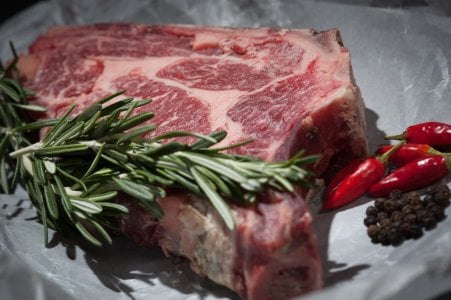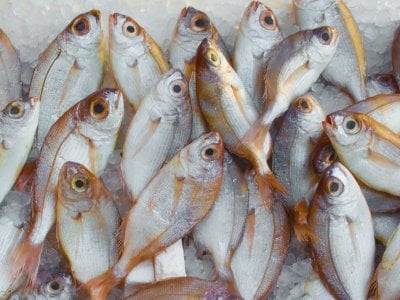Is the food on your plate really safe? Discover shocking truths about food fraud
We all want to believe that the food we put in our bodies is safe. We'd like to think that the vegetables, fruit, fish, and other items we buy from supermarkets and local restaurants have all undergone the necessary safety inspections that ensure they are the real deal.
However, experts warn that we shouldn't underestimate the potential for food fraud.
It's a little-known crime with serious implications—particularly in terms of food safety but also trust in the food industry. More than that, AgriFutures Australia recently reported that food fraud costs the nation's economy $2-3 billion a year.
But what is food fraud exactly?
According to AgriFutures, there is no consistent definition of food fraud. However, it’swidely accepted that food fraud, or product fraud, is committed when food is placed on the market to intentionally deceive consumers into paying a higher price for a product that is not what it claims to be.
This includes putting misleading labels and counterfeiting, substituting, adulterating, diluting or concealing ingredients in our food.
University of New South Wales Food Microbiologist and Associate Professor Julian Cox stated that this practice not only erodes consumer trust but also poses a safety risk to the public.
'Consumers are left in the dark when producers substitute ingredients that could potentially cause adverse health reactions,' he said.
'Whether it's buying honey or olive oil at the supermarket or going to a high-end restaurant and ordering expensive wagyu steak, as consumers, we expect to get what we pay for. It's hard, or even impossible, for the consumer to know what is real and what is fake,' he continued.
‘And typically, we don't question the product we're buying because we put trust in something as fundamental as the food supply chain,’ Associate Professor Cox added.
AgriFuture’s report stated that food fraud is prevalent among agricultural products, fisheries, seafood products, and wood products. More specifically, products like beef and veal, wine, fish, crustaceans and molluscs have been identified as having a higher vulnerability to this practice.
The researchers also specified some scenarios when food fraud is committed. For one, meat products were susceptible to substitution, use of fillers (to increase its weight or volume) or mislabelling as to provenance, quality or attribute (like halal, organic, free-range). Expiry dates may be subjected to fraud as well.
On the other hand, wine products are prone to counterfeiting, dilution, adulteration and mislabelling of provenance and variety of grapes.
For crustaceans and molluscs, instances of substitution and mislabeling of provenance and attribution (like farmed versus wild-caught, frozen or fresh) were also noted.
The report stated: ‘The study found that products are most vulnerable where there is a large difference in value depending on provenance or attributes, and where they are sold in a form that makes verification of the labelling claims (e.g. cuts compared with a whole recognisable item) difficult.’
The globalisation of imports and exports, certain geopolitical issues, and environmental problems have also made it increasingly easy for shady middlemen to sneak in and out of the supply chain, putting what we eat at risk.
'You can pick almost any commodity, any food or beverage, and you can almost guarantee that products within that category have been tampered with somewhere along the supply chain—even if it's in the labelling and claiming to be from a specific region of the world,' explained Associate Professor Cox.
Why is food fraud committed?
AgriFuture claimed that shortages or constraints of supply of raw ingredients, supply chain complexities, technology (like the use of online trading platforms, which are poorly regulated) and weak penalties are the main reasons why food fraud is committed.
More than that, the researchers also pointed out that ‘laws and control systems are absent or insufficient to deter fraudulent practices’.
‘Australian food standards laws and regulations seem not to be supported by active surveillance and targeted product authentication testing to beat or deter fraudsters,’ the report said.
Is there anything consumers can do to avoid being a victim of food fraud?
According to Associate Professor Cox, unfortunately, as consumers, we have few options for staying on top of food fraud or finding out if what we're eating is genuine.
'Unless you're a true expert in that area, you're probably not going to tell if the local fish and chip shop has sold you barramundi or if they've just sold you battered shark meat,' he explained.
But, he also pointed out that early detection and prevention methods, such as authenticity testing or government intervention, could help solve this global problem.
‘It's always in the best interest of the farmers and food distributors themselves to make sure consumers are getting what they're paying for,’ he said. ‘These measures can help protect the integrity of the industry and thus ensure the food quality and safety is not compromised.’
AgriFuture also revealed that despite previous studies proving the prevalence of food fraud, companies' and government authorities’ measures to avoid it have been insufficient.
‘Australian agriculture, fisheries and forestry industry responses to our research revealed inconsistent approaches and strategies,’ the report explained.
‘Some said they had product fraud prevention measures in place, others seemed less concerned and were unwilling to discuss the fraud issue as it could jeopardise consumer trust in their products,’ it said.
The report outlined several recommendations to protect consumers from food fraud. Some of these include authenticity testing, research programs to genetically barcode raw ingredients and comprehensive surveys to investigate levels of food adulteration and substitution.
You can read the full report here.

What’s your take on this story, members? Have you encountered a product affected by food fraud? Share your experience in the comments below.
However, experts warn that we shouldn't underestimate the potential for food fraud.
It's a little-known crime with serious implications—particularly in terms of food safety but also trust in the food industry. More than that, AgriFutures Australia recently reported that food fraud costs the nation's economy $2-3 billion a year.
But what is food fraud exactly?
According to AgriFutures, there is no consistent definition of food fraud. However, it’swidely accepted that food fraud, or product fraud, is committed when food is placed on the market to intentionally deceive consumers into paying a higher price for a product that is not what it claims to be.
This includes putting misleading labels and counterfeiting, substituting, adulterating, diluting or concealing ingredients in our food.
University of New South Wales Food Microbiologist and Associate Professor Julian Cox stated that this practice not only erodes consumer trust but also poses a safety risk to the public.
'Consumers are left in the dark when producers substitute ingredients that could potentially cause adverse health reactions,' he said.
'Whether it's buying honey or olive oil at the supermarket or going to a high-end restaurant and ordering expensive wagyu steak, as consumers, we expect to get what we pay for. It's hard, or even impossible, for the consumer to know what is real and what is fake,' he continued.
‘And typically, we don't question the product we're buying because we put trust in something as fundamental as the food supply chain,’ Associate Professor Cox added.
AgriFuture’s report stated that food fraud is prevalent among agricultural products, fisheries, seafood products, and wood products. More specifically, products like beef and veal, wine, fish, crustaceans and molluscs have been identified as having a higher vulnerability to this practice.
The researchers also specified some scenarios when food fraud is committed. For one, meat products were susceptible to substitution, use of fillers (to increase its weight or volume) or mislabelling as to provenance, quality or attribute (like halal, organic, free-range). Expiry dates may be subjected to fraud as well.
On the other hand, wine products are prone to counterfeiting, dilution, adulteration and mislabelling of provenance and variety of grapes.
For crustaceans and molluscs, instances of substitution and mislabeling of provenance and attribution (like farmed versus wild-caught, frozen or fresh) were also noted.
The report stated: ‘The study found that products are most vulnerable where there is a large difference in value depending on provenance or attributes, and where they are sold in a form that makes verification of the labelling claims (e.g. cuts compared with a whole recognisable item) difficult.’
The globalisation of imports and exports, certain geopolitical issues, and environmental problems have also made it increasingly easy for shady middlemen to sneak in and out of the supply chain, putting what we eat at risk.
'You can pick almost any commodity, any food or beverage, and you can almost guarantee that products within that category have been tampered with somewhere along the supply chain—even if it's in the labelling and claiming to be from a specific region of the world,' explained Associate Professor Cox.
Why is food fraud committed?
AgriFuture claimed that shortages or constraints of supply of raw ingredients, supply chain complexities, technology (like the use of online trading platforms, which are poorly regulated) and weak penalties are the main reasons why food fraud is committed.
More than that, the researchers also pointed out that ‘laws and control systems are absent or insufficient to deter fraudulent practices’.
‘Australian food standards laws and regulations seem not to be supported by active surveillance and targeted product authentication testing to beat or deter fraudsters,’ the report said.
Is there anything consumers can do to avoid being a victim of food fraud?
According to Associate Professor Cox, unfortunately, as consumers, we have few options for staying on top of food fraud or finding out if what we're eating is genuine.
'Unless you're a true expert in that area, you're probably not going to tell if the local fish and chip shop has sold you barramundi or if they've just sold you battered shark meat,' he explained.
But, he also pointed out that early detection and prevention methods, such as authenticity testing or government intervention, could help solve this global problem.
‘It's always in the best interest of the farmers and food distributors themselves to make sure consumers are getting what they're paying for,’ he said. ‘These measures can help protect the integrity of the industry and thus ensure the food quality and safety is not compromised.’
AgriFuture also revealed that despite previous studies proving the prevalence of food fraud, companies' and government authorities’ measures to avoid it have been insufficient.
‘Australian agriculture, fisheries and forestry industry responses to our research revealed inconsistent approaches and strategies,’ the report explained.
‘Some said they had product fraud prevention measures in place, others seemed less concerned and were unwilling to discuss the fraud issue as it could jeopardise consumer trust in their products,’ it said.
The report outlined several recommendations to protect consumers from food fraud. Some of these include authenticity testing, research programs to genetically barcode raw ingredients and comprehensive surveys to investigate levels of food adulteration and substitution.
You can read the full report here.
Key Takeaways
- Food Microbiologist and Associate Professor Julian Cox from the University of New South Wales School of Chemical Engineering and AfriFutures alerted consumers about the significant risks presented by food fraud.
- Food fraud is committed when food is placed on the market to intentionally deceive consumers into paying a higher price for a product that is not what it claims to be.
- Food fraud is not only misleading consumers but can also potentially lead to adverse health
reactions when producers substitute ingredients.
- AgriFuture’s report stated that food fraud is prevalent among agricultural products, fisheries, seafood products, and wood products.
- Prevention methods such as authenticity testing and government intervention can play a crucial role in combating food fraud and protecting the integrity of the industry.
What’s your take on this story, members? Have you encountered a product affected by food fraud? Share your experience in the comments below.









